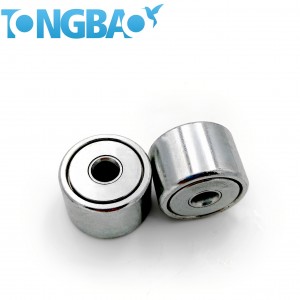Precision Angular Contact Ball Bearing
Product Information

Applications
- Woodworking machinery
- conveyors
- machine tools
- small machining centers
- Tool grinder
- woodworking machine tool
- milling machine
- machining center
- grinder
Load
|
bearing |
Equivalent load |
|
|
Group bearing radial load and installed with interference fit |
Fa=Gm |
|
|
Group bearing radial load and spring preload |
Fa=Gsprings |
|
|
Group bearing axial load and installed with interference fit |
Ka<=3Gm |
Fa=Gm+0.67Ka |
|
Ka>3Gm |
Fa=Ka |
|
|
Group bearing axial load and spring preload |
Fa=Gsprings+Ka |
|
Why Choose us
The maximum speed that a precision bearing can run depends mainly on its allowable working temperature. The working temperature of the bearing depends on the friction heat it produces, including any external heat, and the heat that can be dissipated from the bearing.
1.Our sealed bearing can reach the maximum speed without any friction at the seal.Less friction, less heat,which means higher speed, and higher efficiency.
2.High precision steel balls makes the tolerance of our bearing is smaller, the speed is higher and the noise is lower. Our bearings is heavier than others because of the thick steel retainer, inner and outer race.
3.In general, we use grease lubrication to achieve the maximum speed as far as possible.
Installation
Ultra precision angular contact ball bearings are usually used in groups.
1)When the bearing is heated, the inner diameter and width of the bearing increase. The increased inner diameter is convenient for installation.
2)After cooling, the bearing inner diameter shrinks to obtain the necessary (interference) fit. Its width will also shrink, forming a small gap between bearings. This small clearance has a negative impact on the preload of the bearing group. In order to avoid this situation, when cooling, the bearing inner rings should be pressed against each other, and the pressing axial force should be slightly greater than the disassembly force. When pressing the bearing group, the applied force must not act directly or indirectly on the outer ring.







